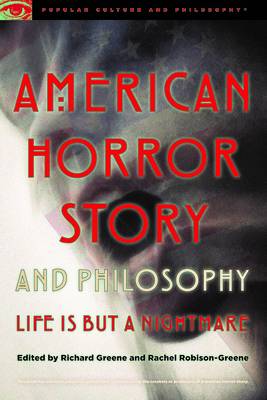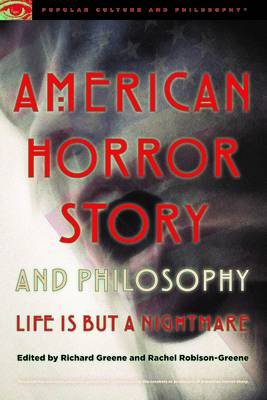
- Retrait gratuit dans votre magasin Club
- 7.000.000 titres dans notre catalogue
- Payer en toute sécurité
- Toujours un magasin près de chez vous
- Retrait gratuit dans votre magasin Club
- 7.000.0000 titres dans notre catalogue
- Payer en toute sécurité
- Toujours un magasin près de chez vous
American Horror Story and Philosophy
Life Is But a Nightmare
22,45 €
+ 44 points
Description
In American Horror Story and Philosophy, philosophers with varying backgrounds and interests explore different aspects of this popular "erotic thriller" TV show, with its enthusiastic cult following and strong critical approval. The result is a collection of intriguing and provocative thoughts on deeper questions prompted by the creepy side of the human imagination. As an "anthology show," American Horror Story has a unique structure in the horror genre because it explores distinct subgenres of horror in each season. As a result, each season raises its own set of philosophical issues. The show's first season, Murder House, is a traditional haunted house story. Philosophical topics expounded here include: the moral issues pertaining to featuring a mass murderer as one of the season's main protagonists; the problem of other minds--when I see an old hag, how can I know that you don't see a sexy maid? And whether it is rationally justified to fear the Piggy Man. Season Two, Asylum, takes place inside a mid-twentieth-century mental hospital. Among other classic horror subgenres, this season includes story lines featuring demonic possession and space aliens. Chapters inspired by this season include such topics as: the ethics of investigative reporting and whistleblowing; personal identity and demonic possession; philosophical problems arising from eugenics; and the ethics and efficacy of torture. Season Three, Coven, focuses on witchcraft in the contemporary world. Chapters motivated by this season include: sisterhood and feminism as starkly demonstrated in a coven; the metaphysics of traditional voodoo zombies (in contrast to the currently fashionable "infected" zombies); the uses of violent revenge; and the metaphysics of reanimation. Season Four, Freak Show, takes place in a circus. Philosophical writers look at life under the Big Top as an example of "life imitating art"; several puzzles about personal identity and identity politics (crystallized in the two-headed girl, the bearded lady, and the lobster boy); the ethical question of honor and virtue among thieves; as well as several topics in social and political philosophy. Season Five, Hotel, is, among other disturbing material, about vampires. Chapters inspired by this season include: the ethics of creating vampire progeny; LGBT-related philosophical issues; and existentialism as it applies to serial killers, Season Six, Roanoke, often considered the most creative of the seasons so far, partly because of its employment of the style of documentaries with dramatic re-enactments, and its mimicry of The Blair Witch Project and Paranormal Activity. Among the philosophical themes explored here are what happens to moral obligations under the Blood Moon; the proper role of truth in storytelling; and the defensibility of cultural imperialism.
Spécifications
Parties prenantes
- Editeur:
Contenu
- Nombre de pages :
- 256
- Langue:
- Anglais
- Collection :
Caractéristiques
- EAN:
- 9780812699722
- Date de parution :
- 12-12-17
- Format:
- Livre broché
- Format numérique:
- Trade paperback (VS)
- Dimensions :
- 152 mm x 226 mm
- Poids :
- 340 g

Les avis
Nous publions uniquement les avis qui respectent les conditions requises. Consultez nos conditions pour les avis.





